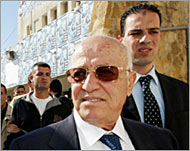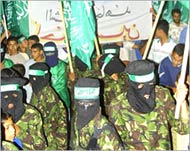Palestinian ceasefire talks fail
Palestinian resistance factions have failed to agree on a comprehensive ceasefire to offer Israel after four days of truce talks in Egypt.

The talks broke down on Sunday over the issue of whether to offer a complete unilateral ceasefire without a similar commitment from Israel.
“The talks have reached a dead end,” said Husam Arafat, a senior official in the Popular Front for the Liberation of Palestine-General Command.
“There was no agreement on the Egyptian proposal for a total ceasefire or to authorise the Palestinian authority to pursue peace moves,” he said.
Egypt’s intelligence chief Umar Sulayman and Palestinian Prime Minister Ahmad Quraya had met leaders of 12 resistance factions to try to resolve differences over a possible total truce.
Conditional halt
Earlier, the groups said they could offer a conditional halt to resistance attacks within Israel, allowing the possibility of resistance attacks on occupation soldiers and illegal settlers in the occupied West Bank and Gaza Strip.
 |
|
Talks’ failure makes Quraya’s |
The factions blamed Israel for undermining a previous unilateral truce declared by Palestinian factions in June that collapsed after Israel assassinated a leading Hamas member two months later.
“Israel must commit itself to end all forms of attacks on the Palestinian people” for the factions to agree on a full ceasefire,” Quraya said.
But Israel had warned it would reject anything less than a total unilateral Palestinian ceasefire. A source close to Israeli Prime Minister Ariel Sharon’s government said on Sunday they would not accept “half-measures”.
Differences
Divisions had emerged earlier between the groups taking part in discussions over Egypt’s proposal that they halt anti-occupation attacks for a year if Israel made reciprocal gestures.
 |
|
Hamas wants Tel Aviv to fulfil |
Hamas and Islamic Jihad, spearheading the Intifada, proposed the factions agree to “spare civilians” rather than sign up to a full-blown freeze on attacks.
For this plan to stick, Israel would have to fulfil three conditions, including lifting crippling blockades around Palestinian cities and towns, ending raids and house demolitions in the occupied Palestinian territories and freeing all detainees being held in Israeli prisons.
Five Palestinian movements rejected the idea on the grounds that Israel was offering no concessions in return. Six factions support a 12-month truce and the remaining movement is in favour provided several conditions are fulfilled.
Tensions
An official from Palestinian President Yasir Arafat’s Fatah movement accused Hamas of driving the closed-door talks into an impasse.
Quraya had hoped to use a truce as a tool to broker a ceasefire with Israeli Prime Minister Ariel Sharon’s hardline government.
Cairo hopes a truce will allow Quraya to secure a ceasefire with the Israeli government and kickstart the US-backed “road map” aimed at ending the Palestinian-Israeli conflict.
The groups have also failed to reach agreement on a unified political command. Fatah and PFLP officials said this could not take place until a truce was declared.